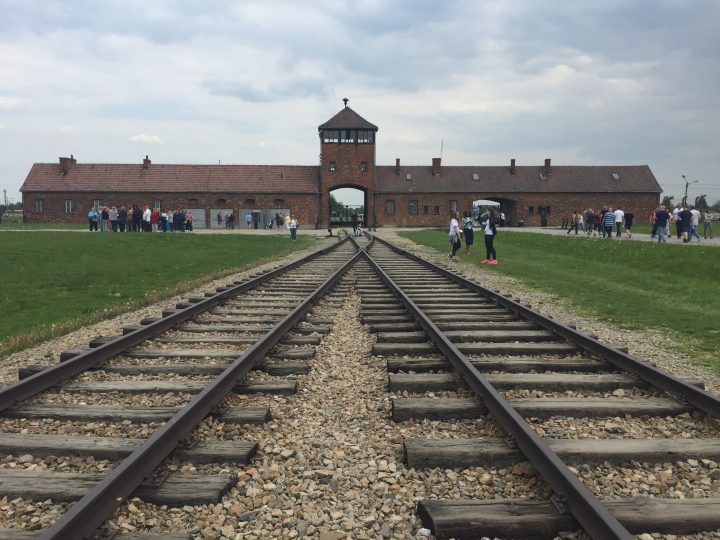
An Education in Intolerance
On 2 November, I had the privilege of hearing Elly Gotz, a retired engineer, businessman, and a Holocaust survivor, speak at one of his many talks on intolerance he does at various schools, universities, and public functions. I met Elly in May earlier this year at the March of Remembrance and Hope (MRH), an educational leadership program that teaches the dangers of intolerance through the study of the Holocaust. Elly was born in Lithuania and was deported to Dachau in Germany during the Second World War. Even though I had spent ten days with him in Germany and Poland, I was very excited to finally listen to one of his talks that he does throughout the year. This wonderful event was organized by a friend who I had met on the MRH trip this past May.
At 89, Elly has thirty-eight talks at various locations throughout Toronto in the next six weeks. That is a rigorous schedule for anyone of any age, but he does it with grace and absolutely adores it. He opens his story by informing everybody that he is in the business of learning. He spends his life learning. After spending ten days with him, I know this is a real testament to his great capacity for life, and those words are so fitting coming from his mouth. It makes me smile instantly.
The Experience
I first heard about the trip from one of my history professors a week before the deadline last January. The itinerary of the trip consisted of many sites I had always wanted to visit: the grave of Moses Mendelssohn; Bebelplatz (site of the infamous 1933 Nazi book burning); Tiergarten memorials to the gay victims and Roma and Sinti victims; the Reichstag; Track 17 (Memorial at Grunewald Train Station, site of deportations 1941-42); Wansee Haus; Kazimierz; Auschwitz I; Birkenau; Plaszow; and Treblinka. These were just a few of the things we did. I was a little hesitant about applying as I didn’t know much about the program. However, I prepared my application and sent it in. I found out a month later that I was accepted.
Throughout the next few months, the applicants selected to go participated in several webinars on various subjects including genocide and anti-Semitism. I knew none of my fellow participants before going, and this made me a little nervous as I am far from being an experienced traveler. We all met for a day in Toronto for an orientation before leaving for Germany. And then we were off.
The experience of being on the trip itself, the emotions you feel, and the discussions you have are so incredible and stimulating. It really is an experience difficult to put into words. I left with strangers and came back with a family. We all came from a variety of different cultural backgrounds, university educations, religious beliefs, different sexualities and genders, different political views, different personalities, and different walks of life. However, we all came together for one reason—to study what humanity is capable of when there is intolerance. This goal heightened the already dynamic experience on the trip. I could write thousands of words about the heartache I felt while visiting the ashes of Majdanek or the cemeteries of Poland, but I know I will not do the experience any justice.
Bringing it Home
One doesn’t always expect a study of the past to be so forward reaching and currently relevant. It facilitated many discussions on other genocides throughout history and similar issues facing humanity today. The differences in memorialization of the Shoah between Germany and Poland were particularly notable. Even more thought provoking was the comparison of memorialization and discussion on atrocities and horrid histories in Europe to those of North America. Canada has a long history of indigenous genocide, including cultural, physical, and biological genocide. However, Canada has often and currently falls short of dealing with and being in dialogue with what can only be described as a horrific past. The MRH trip provided an outside perspective on viewing the issues facing Canadian Indigenous populations and ways to combat these issues together.
So here I am—thousands of Whatsapp messages, hundreds of Facebook posts, countless pictures, infinite memories, a million things learned and six months later—encouraging anyone interested in intolerance studies to apply. It isn’t a major time commitment and lands at the beginning of the summer over the Victoria May long weekend. It is an excellent way of doing something memorable and educational this summer while still working/travelling/volunteering throughout the rest of the summer. The trip also provides excellent commentary on the practice of law and human rights. The trip is open to any student attending university in Canada with a passion for learning more about genocidal studies. The cost of the trip is on a financial need basis, so it is very flexible financially. The program is ten days long with approximately thirty other students from across Canada, and one of the most unique things about the trip is having a survivor join the group. The MRH program was among the ten greatest days of my life and will continue to affect how I approach everything in every day of my life afterwards.
Learn more about the MRH program and apply to join by January 6, 2017, at www.marchofremembranceandhope.org.
Please feel free to contact me with any questions about the trip—I am always eager to share and help!
